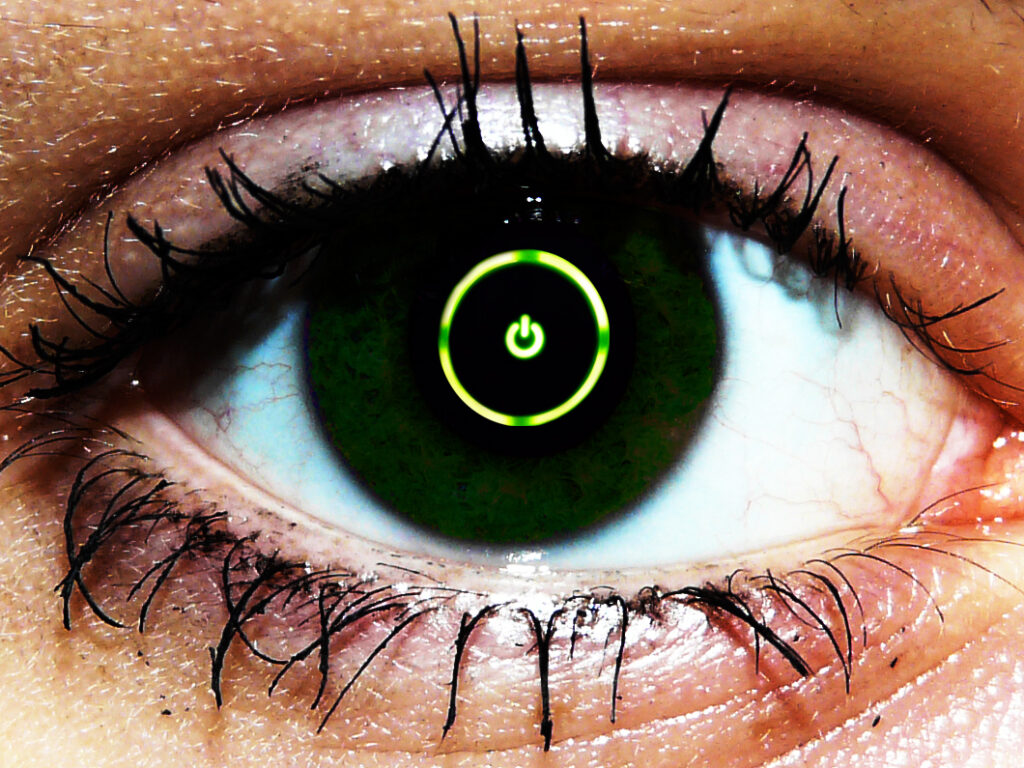With computer screens increasingly used in people’s working lives it is vitally important that your staff have the eye protection they not only need, but are legally entitled to.
Protecting employees’ eyesight against computer screen use is not just the law, it also makes good business sense. But despite that, Specsavers research has revealed that 73% of companies are not complying with the law. In the late 1980s a sudden surge of computer use was met with real concerns that the radiation from screens could damage eyes. Thus the Health and Safety (Display Screen Equipment – DSE) Regulations 1992 were established.
Extensive research has since found no evidence that screens can cause permanent damage to eyes, but long spells of use can lead to tired eyes and discomfort, which in turn will impact on the individual’s concentration and productivity. The regulations, which were amended in 2002, are still in place to protect workers who regularly use monitors. All can request that their employer pays for them to have an eye examination, and glasses if necessary. However the research revealed that this legislation is misunderstood by both employers and employees.
Jim Lythgow, director of strategic alliances for Specsavers Corporate Eyecare says: ‘Companies must make sure that they are fully aware of the stipulations, so that they ensure they are caring for their employees’ health and are not incurring unnecessary costs.’
In reality the legislation is simple, and the solutions are easily accessible and cost effective. For example, not everyone using a computer screen will require glasses, but for those that do it is possible to have an eye examination and complete glasses for as little as £17 per person. With a number of opticians offering competitive corporate schemes there is no need to pay over the odds.
Who should pay?
The regulations require employers to provide this basic level of eye care to computer screen users. There is also an entitlement to further tests at regular intervals – the optometrist doing the first test can recommend when the next should be. Employers only have to pay for glasses if special ones – for example, prescribed for the distance at which the screen is viewed – are needed and normal ones cannot be used. Simple enough, but a Specsavers survey of 187 employers representing between 295,556 and 448,629 staff revealed that this legislation is worryingly misunderstood.
It revealed that 13% of companies have no eyecare policy and 6% do not offer any company-funded eye tests to staff. This is in direct breach of the regulations. On the flipside, 35% of companies offer free eye tests to everyone in the company, whether they use DSE or not.
Beyond simply complying with legislation, most respondents agreed there were recruitment and retention benefits from providing corporate eyecare. Almost three-quarters (73%) thought it made them a more responsible employer and 28% felt is offered a better benefits package. The majority also understood the advantages of full eye examinations. Beyond checking your employee’s vision, a routine eye test at the opticians also provides a comprehensive health assessment. It can detect signs of a number of underlying conditions such as diabetes, glaucoma, cataracts, high blood pressure and even life-threatening tumours. Almost two-thirds of respondents were aware of this.
Despite all this it seems amazing that 13% of companies do not have an eyecare policy at all, and 39% of their employees see it as less important than the other health benefits they receive.
Keeping costs down
It is logical that employers want to make this provision of eyecare as cost-effective as possible. However, another expensive misunderstanding is who should be elected to carry out the eye care. Nearly half (48%) of respondents believe that employees are free to decide which opticians they go to. But in fact it is up to the employer to appoint the eyecare provider, and it is important they do this. By ensuring all staff use the same eyecare provider, just as they would all sign up to the same medical insurance scheme, not only ensures that the company will get the best deal, but also that all employees will receive a consistent level of service.
The research revealed that 16% of employers expect to pay in excess of £100 to provide staff with an eye test and glasses, 71% think it will cost more than £50 and 81%, more than £20. Only 13% correctly believe that corporate eyecare provision is actually possible for less than £20 per person, which is perhaps an indication of just how many employers are paying more than they need to.
Organisations are increasingly making use of voucher schemes as they provide the greatest possible transparency, equality of care for staff and cost-effectiveness. An alternative is to let staff claim back on expenses.
Computer work is not risky
While the DSE regulations aim to protect the health of people who use them it does not mean that such work is risky. If the user follows good practice, like setting up their workstation well and taking breaks in intensive work, then there is no reason why it is not totally safe.
People who need glasses for reading may also need to use them for computer work. Even people with nothing wrong with their eyesight can find that they get headaches when using a computer for too long. Shifting gaze from screen to keyboard means eyes have to change focus quickly, which may result in eyestrain. But specially-tailored glasses with tints and lens treatments to reduce screen glare can help.
Ensuring that staff are able to work to the best of their potential clearly matters to the overwhelming majority of UK firms. One of the most encouraging findings of the Specsavers survey was the 73% of respondents who said that they were happy to provide eyecare as a responsible employer, and not simply because regulations were in place.
Jim Lythgow is Director of Strategic Alliances, Specsavers Corporate Eyecare







